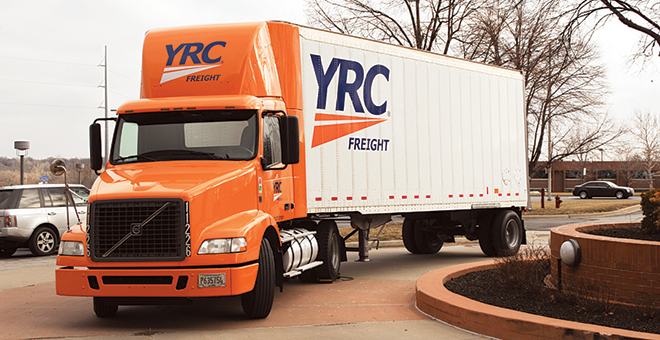Managing Editor, Features and Multimedia
YRC, Union Pacific Execs Laud Tax Reform as Boon for Transportation Industry

ATLANTA — YRC Worldwide CEO James Welch and an executive at Union Pacific predicted that tax reform will drive further economic growth and higher freight demand, but voiced concerns about the future of NAFTA and the continued challenge of attracting younger workers during a logistics conference here.
They also looked ahead to a year in which freight capacity is expected to tighten amid a strong economy, putting even more pressure on driver recruiting.
Against the backdrop of a three-day shutdown of the federal government over a funding impasse, YRC’s Welch decried a lack of vision and cooperation in Washington but nonetheless pointed to tax reform as a significant boon for the transportation industry.
The new tax law will “give our piece of the economy a continued leg for growth,” he said Jan. 22 at SMC³’s annual Jump Start conference.
Jason Hess, vice president and general manager for Union Pacific’s intermodal and automotive business, also lauded the tax-reform package.
Union Pacific’s Jason Hess: “It appears that capacity could tighten with ELDs and even stronger demand.” #JS2018 @SMC3_Inc — Seth Clevenger (@SethClevenger) January 22, 2018
“It’s going to make American companies compete better globally,” he said. “In our industry, whether it’s rail or transportation, stronger American companies mean more goods and services that we can move.”
In fact, Hess said that the overall regulatory environment is becoming more business-friendly, a shift that is providing companies with a greater degree of certainty as they plan for the future.
Welch, who first joined what was then Yellow Transportation in 1978, added that until about one year ago the industry had become more highly regulated than it had been prior to deregulation in 1980.
Safety, however, remains an appropriate area for government oversight, noted Welch, who plans to retire July 31.
Electronic logging devices, for example, “have been a good thing,” he said.
YRC’s James Welch: “E-commerce is dramatically changing the entire supply chain distribution process.” Companies are scrambling to establish full fledged or quasi fulfillment centers. #JS2018 @SMC3_Inc — Seth Clevenger (@SethClevenger) January 22, 2018
Welch said safety must be the top priority for all carriers in today’s world, where truck drivers are traveling alongside motorists who often are distracted by their phones, texting or even watching videos. “It’s incredible what our drivers see,” he said.
YRC Worldwide, based in Overland Park, Kan., ranks No. 5 on the Transport Topics Top 100 list of the largest for-hire carriers in North America.
Despite their optimism about the economy, Welch and Hess cited ongoing negotiations over the North American Free Trade Agreement as a cause for concern.
Hess said 14 million jobs are tied to cross-border trade with Canada and Mexico.
Modernizing NAFTA makes sense, he said, but killing the trade agreement altogether could have dire consequences.
The benefits of a growing economy and a revised tax code “can be completely erased if we’re going to scrap NAFTA,” Hess said.
In the meantime, truck capacity may contract this year as freight demand rises and enforcement of hours-of-service limits tightens under the ELD mandate, which went into effect Dec. 18.
“It does appear that capacity has tightened,” Hess said, based on his conversations with intermodal customers.
However, it’s still too early to know if that contraction is a direct result of ELDs, he said.

YRC Worldwide
Welch said the driver shortage continues to be a challenge, even for less-than-truckload carriers such as YRC that offer jobs with more consistent home time than longhaul truckload operations.
Dockworkers and truck technicians also are difficult to recruit.
“We’re having a difficult time attracting the younger employee that wants to work on a dock in tough conditions or sit behind the wheel of a tractor and see the country,” he said.
Nonetheless, YRC remains “very astute” in how it recruits, Welch said. The company focuses on hiring only drivers who are safe and have the right mindset to drive alongside a highly distracted motoring public.
YRC operates its own truck driving schools and recruits heavily from the military, he said, but it’s still a struggle to find people who want to do these jobs.
The average age of a driver at YRC is about 53, Welch said, and there doesn’t appear to be a younger group of workers ready to fill their ranks.
“Those are things that concern me as we move through 2018 and 2019, especially with the economy doing great,” he said. “Jobless rates are down, so it’s harder to find people that need a job.”




